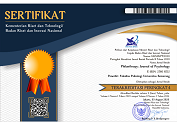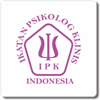Prinsip Kepemimpinan Character of A Leader pada Era Generasi Milenial
Abstract
Tujuan dari penulisan karya ilmiah ini adalah mengetahui prinsip kepemimpinan Character of A Leader yang sesuai untuk generasi milenial. Generasi millenial dewasa ini tidak hanya unggul dalam bidang teknologi dan ilmu pengetahuan, kaum muda ini kini mulai menjadi trendsetter dalam bidang social, politik, budaya dan ekonomi. Di era globalisasi, tidak bisa dipungkiri bahwa seiring berkembangnya teknologi yang berbasis digital application, para generasi millennial rentan akan dampak negatif yang ditimbulkan oleh media sosial, namun di lain sisi, generasi muda ini juga memberikan pengaruh yang signifikan terhadap kemajuan bangsa sehingga dibutuhkan karakter pemimpin yang sesuai untuk memimpin generasi milenial. Metode yang digunakan dalama penulisan karya ilmiah yaitu studi literatur melalui buku, jurnal, dan berita cetak/online. Karya ilmiah ini memberikan gambaran bagaimana karakter pemimpin yang cocok untuk generasi milenial. Berdasarkan studi literature karakter yang harus dimiliki pemimpin milenal 1) Mampu menjadi teladan yang baik, 2) Memiliki rasa tanggung jawab 3) Berani mengambil dan bersedia menerima resiko 4) Mempunyai sense of belonging dari para bawahan dan sense of participation 5) Menciptakan kerjasama yang baik di kalangan anggota merupakan karakter
Keywords
Full Text:
PDFReferences
Ali, U., & Waqar, S. (2013). Teachers Organizational Citizenship Behavior Working Under Different Leadership Styles. Pakistan Journal of Psychological Research, 28(2), 297 316.
Altuntas, S., & Baykal, U. (2010). Relationship Between Nurses Organizational Trust Levels And Their Organizational Citizenship Behaviors. Journal of Nursing Scholarship, 42(2), 186 194. https://doi.org/10.1111/j.1547-5069.2010.01347.x
Bell, E. E. (2015). Understanding African American Males Schooling Experiences : A Qualitative Inquiry Understanding African American Males Schooling Experiences : A, 20(8), 1260 1269.
Bosscher, I. C. (2013). My How Things Have Changed ! Strategic Organization Development and the Transformation of Human Resource Management My How Things Have Changed ! Strategic Organization Development, 18(20), 1 5.
Brander, R. A., Patterson, M., & Chan, Y. E. (2012). The Qualitative Report Fostering Change in Organizational Culture Using a Critical Ethnographic Approach Fostering Change in Organizational Culture Using a Critical Ethnographic Approach. The Qualitative Report, 17(45), 1 27. Retrieved from http://nsuworks.nova.edu/tqr%5Cn http://nsuworks.nova.edu/tqr/vol17/iss45/2
Carlyle, E. (2008). Organizational Cultural Design Factors Leading to Positive Behavior Changes Among Employees. https://doi.org/UMI : 3257958
Choi, S.-Y. (2014). The Effects of Leadership on Social Workers Organizational Commitment: Focussing on Ethical Leadership, Organizational Trust, and Supervisor Trust. Information, 17(10(A)), 4771 4778.
Chullen, C. L., Dunford, B. B., Angermeier, I., Boss, R. W., & Boss, A. D. (2010). Minimizing Deviant Behavior In Healthcare Organizations: The Affects Of Supportive Leadership And Job Design. Journal of Healthcare Management, 55(240), 381 397.
Cullen, K. W., Baranowski, T., Baranowski, J., Hebert, D., DeMoor, C., Hearn, M. D., & Resnicow, K. (1999). Influence of School Organizational Characteristics on the Outcomes of a School Health Promotion Program. Journal of School Health, 69(9), 376 380. https://doi.org/10.1111/j.1746-1561.1999.tb06433.x
Dillard, J. P., Hale, J. L., & Segrin, C. (1994). Close Relationships in Task Environments: Perceptions of Relational Types, Illicitness, and Power. Management Communication Quarterly, 7(3), 227 255. https://doi.org/10.1177/0893318994007003001
Egbert, M. D., & P ©rez-Mercader, J. (2016). Adapting to Adaptations: Behavioural Strategies that are Robust to Mutations and Other Organisational-Transformations. Scientific Reports, 6(January), 1 10. https://doi.org/10.1038/srep18963
Erkutlu, H. (2011). The Moderating Role Of Organizational Culture In The Relationship Between Organizational Justice And Organizational Citizenship Behaviors. Leadership & Organization Development Journal, 32(6), 532 554. https://doi.org/10.1108/01437731111161058
Huey Yiing, L., & Zaman Bin Ahmad, K. (2009). The Moderating Effects Of Organizational Culture On The Relationships Between Leadership Behaviour And Organizational Commitment And Between Organizational Commitment And Job Satisfaction And Performance. Leadership & Organization Development Journal, 30(1), 53 86. https://doi.org/10.1108/01437730910927106
Huffman, J. B. (2015). Organizational Behavior : Perceptions Analysis Of Micro And Macro Organizational Behavior In An Organizational Setting Joshua T . Delich , B . A ., Me . D . Dissertation Prepared For The Degree Of Doctor Of Philosophy December 2015 Approved : Don Powell ,.
Kamani, S. M. H., & Namdari, K. (2012). A Study Of The Relationship Between Organizational Justice And Support And Organizational Citizenship Behavior. International Journal of Arts and Sciences, 5(6), 355 368.
Khan, M. L., Salleh, R., & Hemdi, M. A. B. (2016). Effect Of Protean Career Attitudes On Organizational Commitment Of Employees With Moderating Role Of Organizational Career Management. International Review of Management and Marketing, 6(4), 155 160. Retrieved from https://www.scopus.com/inward/record.uri?eid=2-s2.0-84969913395&partnerID=40&md5=8a269a1e5ec72ebfb9c968ea7594626d
Ko ak, S., & Burgaz, B. (2017). The Role of Leader Empowering Behaviours in Psychological Contract at High Schools. TeEği̇ti̇m VBi̇li̇m, 42(191), 351 370. https://doi.org/10.15390/EB.2017.7101
Lambert, E. G., Hogan, N. L., Dial, K. C., Altheimer, I., & Barton-Bellessa, S. M. (2012). Examining The Effects Of Stressors On Organizational Citizenship Behaviors Among Private Correctional Staff: A Preliminary Study. Security Journal, 25(2), 152 172. https://doi.org/10.1057/sj.2011.16
Lambert, S. J. (2000). Added Benefits : the Link Between Work-Life Binefits and Organizational Citizenship Behavior. Academy of Management Journal, 43(5), 801 816. https://doi.org/10.2307/1556411
Lieberman, E. A. (2006). What S Fair Is Fair , Or Is It ? The Effects Of Merit-Related Managerial Behaviors And Organizational Policies On Organizational Justice Perceptions By Eric A . Lieberman A Dissertation Submitted To The Graduate Faculty In Psychology In Partial Fulfillm.
Limbos, M. A. P., & Casteel, C. (2008). Schools And Neighborhoods: Organizational And Environmental Factors Associated With Crime In Secondary Schools. Journal of School Health, 78(10), 539 544. https://doi.org/10.1111/j.1746-1561.2008.00341.x
Lu, Y., Bugenhagen, M. J., Ph, D., Carvan, M. K., Ed, D., Reed, J. G., & Ph, D. (2010). The Relationship Between Leaders Behaviors & Organizational Learning Actions By A Dissertation Submitted In Partial Fulfillment Of The Requirements For The Degree Of Doctor Of Philosophy Specialization : Leadership Studies Under The Supervision Of Fond, (August).
Mangi, A. A. (n.d.). Significance of Power and Politics : Its Influence on Organizational Behavior Towards Efficacy, 41(1968), 221 229.
Mogotsi, I. C., Boon, J. A., & Fletcher, L. (2011). Modelling The Relationships Between Knowledge Sharing, Organisational Citizenship, Job Satisfaction And Organisational Commitment Among School Teachers In Botswana. African Journal of Library Archives and Information Science, 21(1), 41 58. https://doi.org/10.1017/CBO9781107415324.004
Myrsiades, L. S. (1987). Corporate Stories as Cultural Communications in the Organizational Setting. Management Communication Quarterly, 1(1), 84 120. https://doi.org/10.1177/0893318987001001005
Padgett, J., Gossett, K., Mayer, R., Chien, W.-W., & Turner, F. (2017). Improving Patient Safety through High Reliability Organizations. Qualitative Report, 22(2), 410 425.
Setyaningrum, R. P. (2017). Relationship Between Servant Leadership In Organizational Culture, Organizational Commitment, Organizational Citizenship Behaviour And Customer Satisfaction. European Research Studies Journal, 20(3), 554 569. Retrieved from https://www.scopus.com/inward/record.uri?eid=2-s2.0-85028028298&partnerID=40&md5=3cb8423750e59ad03660ad8bb0fbf300
Shang, H., Huang, P., & Guo, Y. (2010). Managerial cognition: the sources of sustainable competitive advantage in hypercompetition. Nankai Business Review International, 1(4), 444 459. https://doi.org/10.1108/20408741011082589
Shanker, M. (2016). Organizational Citizenship Behavior and Organizational, 11(2), 397 408.
Somech, Anit: Drach-Zahavy, A. (2004). Exploring Organizational Citizenship Behaviour From An Organizational. Journal of Occupational and Organizational Psychology, 77, 281 298.
Wilbon, A. (1997). Organizational and Developmental Dynamics of Project Review Teams in Technology Environmen. The Qualitative Report, 3(3), 1 20. Retrieved from http://nsuworks.nova.edu/tqr/vol3/iss3/3%5Cnhttp://nsuworks.nova.edu/tqr/vol3/iss3/3/?utm_source=nsuworks.nova.edu%2Ftqr%2Fvol3%2Fiss3%2F3&utm_medium=PDF&utm_campaign=PDFCoverPages
Wu, W., Tang, F., Dong, X., & Liu, C. (2015). Different Identifications Cause Different Types Of Voice: A Role Identity Approach To The Relations Between Organizational Socialization And Voice. Asia Pacific Journal of Management, 32(1), 251 287. https://doi.org/10.1007/s10490-014-9384-x
Yoon, D., Jang, J., & Lee, J. (Jay). (2016). Environmental management strategy and organizational citizenship behaviors in the hotel industry. International Journal of Contemporary Hospitality Management, 28(8), 1577 1597. https://doi.org/10.1108/IJCHM-10-2014-0498
DOI: http://dx.doi.org/10.26623/philanthropy.v2i2.1151
Refbacks
- There are currently no refbacks.
Copyright (c) 2018 PHILANTHROPY: Journal of Psychology












